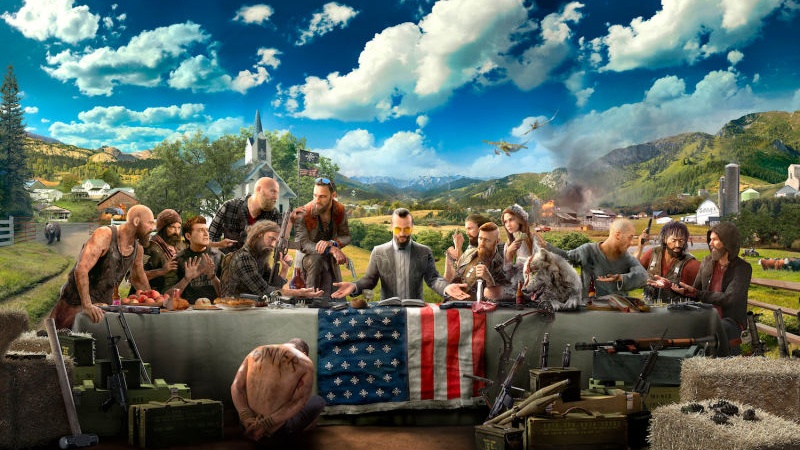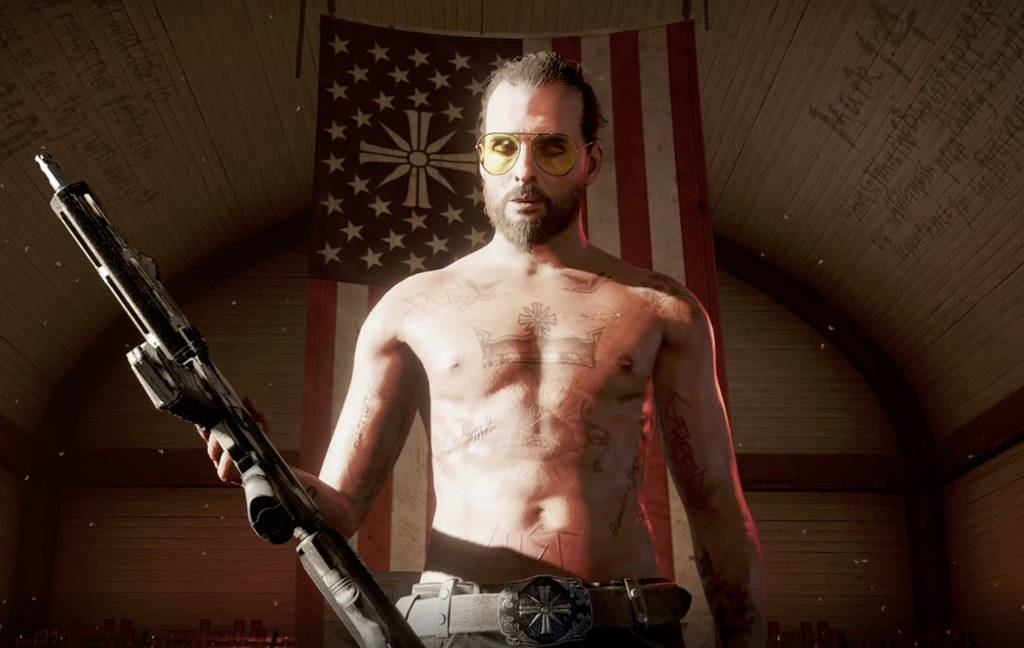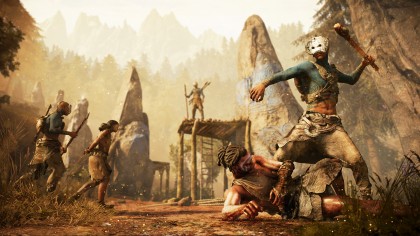‘Reality is stranger than fiction’: talking Far Cry 5 with Dan Hay
"You've got to realize that people want an experience that's alive and living"

While Far Cry has never been a series that’s seemed particularly averse to controversy, the latest game in the franchise, Far Cry 5, seems to be courting it more than most.
We got the chance to sit down with the game’s creative director Dan Hay to chat cults, the real-life parallels that are being attached to the game, and where the series might go from here.
Jumping straight into the world of Far Cry 5 itself, we asked Hay about the decision to set Far Cry 5 in Montana, America.
Cults and controversy
Though previous Far Cry games have been set in real locations, the setting for Far Cry 5 is more specific than any we’ve seen before. When it was first announced, we told Hay, it struck us as somewhat, well, ‘wow.’
“I’m glad you said that” he laughs, “It does seem wow. The thing we try to focus on in Far Cry is that it’s always a surprise.
"The challenge we had is that I think in Far Crys in the past we’ve had a tendency to spin the globe and go where’s it going to be next? [points] and that’s where it’s going to be. And that’s okay. That’s one way of doing it. But the other way was to think [...] we’ve been leveraging exotic locations that the average person might not be able to go to. Why don’t we take a look at home, at the things next door? A look at the fact that reality is stranger than fiction, and that maybe what’s going on next door is just as potent, exotic and beyond your imagination.”
'Maybe what’s going on next door is just as potent, exotic and beyond your imagination.'
Dan Hay, Creative Director
It’s this ‘looking next door’ angle that led the Ubisoft Montreal team to turn its attention to the US
Sign up for breaking news, reviews, opinion, top tech deals, and more.
“We were in a meeting throwing out states,” Hay recounts, “and someone said ‘what about Montana?’ And somebody else goes ‘Montana? I know nothing about that.’ [Hay takes a pause here] ...Not bad. And then we started to learn about it. It’s a really rugged place, the people are really cool – they live a lifestyle that’s very frontier. They’re self-sufficient and some folks go there because they want to be left alone. That’s a recipe for what we do.”

Of course, it’s hard to talk about modern day America without hitting some kind of political nerve.
Far Cry 5 has, in some ways, swerved direct political associations by going down the route of exploring cults. However, when we pointed out that in western politics there seems to be something of a Cult of Personality taking place and asked whether any parallels between his game and reality (whether intentional or not) scared him, Hay considered his answer.
“It’s a question I get asked a lot,” he explains, “You asked does it ever scare me? I think it’s definitely unsettling and I think it’s just a matter of tapping into that we all have a kind of shared experience.
'I think it’s just a matter of tapping into that we all have a kind of shared experience.'
Dan Hay, Creative Director
"It’s been interesting to see the themes that I experienced in the 80s with the end of the Cold War and people feeling we were this close [to the end of the world]. Then that time was over and there was a kind of gulf - a space where people really didn’t feel like the world was going to end but I’m not confident that’s true anymore. And what’s really interesting is to know that as a kid I was deathly afraid of this, and as an adult I’m afraid for my kids but there was a space in between where it was kind of carefree where everyone just had a collective sigh of relief. And so it’s unnerving and unsettling.”
Hay often gets asked, as many developers and creators who create fiction that that clips close to our reality do, how he knew what would happen. But, like everyone else he told us he had “no clue, no idea.”
“But I think we’re all drinking the same water,” he continues, “listening to the same stuff on TV. We’re subject to the same inputs coming from all over the place. When we began to conceive this game I think some part of that influences our brains and what we create.”
Real-life parallels
There’s a difference, however, between picking up on a cultural and political feeling and trying to react directly to specific events:
“There’s then an opportunity to try and react to that [shared influence] every day which I don’t think you can keep up; think about the number of things that have changed just in the last year. I think if we get fish hooked by every single headline and every single thing that happens – you know – you try to make everything you make nothing.”
Rather than trying to make specific comments, then, Hay's team “really focused on pouring the commitment of that fear of the end of the world into the father. We focused on doing our due diligence on creating a cult that felt real and believable and characters that felt real and believable but also not forgetting that it’s a game and it needs to be fun.”

While the tone of the father and its “dark elements” are the “spine” of the game, Hay tells us, “there’s a lot of meat around it and there’s a lot of other stuff that build the body of this game. So it’s going to be okay for players to go out and just blow stuff up, have a crazy time, play co-op, take their guns for hire and, you know, play Far Cry.”
'It's a game and it needs to be fun.'
Dan Hay, Creative Director
However, he adds, “for the players that want it they’ll be able to ease in and snack on elements of an earnest story with unique characters. They’ll be able to drink that in to the degree that they want to and think about it. If they leave the game saying ‘I played it this way, I had an amazing experience, this was super cool’ and someone else has played the same game and has authored a different story but [both experiences] share elements that build a conversation that’s somehow applicable today that’s okay.”
The game is, then, somewhat open to player projection and Hay seems comfortable with the idea, admitting that “people will build their own opinions” and “without giving too much away there’ll be stuff to talk about.”
Creative responsibility
Given that the game could potentially prompt conversations in the areas, we asked Hay if he feels that games as a medium have any kind of political or social responsibility. Putting the player in control and empowering them as they do, games are quite unique in their potential to proffer comment without creating a sense of alienation.
“There’s a couple of different ways to approach that,” Hay replied thoughtfully. “One would be to say yes, for sure, absolutely. But what I’ve learned over time as I get older is that every single time – and this will sound ridiculous because it’s an absolute – but every time I speak with an absolute voice I end up saying something that’s not smart.
'What I think I would say is that games have matured to a point where they can. They can explore subjects that movies, television and radio dramas have been for a long time.'
Dan Hay, Creative Director
"What I think I would say is that games have matured to a point where they can. They can explore subjects that movies, television and radio dramas have been for a long time. It can be a conversation. Are they obligated to? I don’t know the answer to that question. But I do know that as a medium, as an opportunity, we can make characters that are born in this world, that listen to the same radio, watch the news and have opinions that are similar to characters we have in the real world. And that’s what makes them so interesting.”
Though Hay used characters that could exist in the real world to populate his game, we wondered if engaging with cults (a far less every day affair) for a long period of time affected him.

“I think so” he nods, “As a human being you learn new stuff and you level up. There’s no way that building this game has not affected me. No way. It’ll be interesting if I have some space when it’s all over to data mine how it’s affected me. When we started out building a magnetic leader I had some preconceptions. Number one was that I’m smart enough not to be taken into a cult and I think a lot of people feel that way.”
A cult connection
It was this belief, he told us, that allowed he and his team to set a bar. Hay says they went about “finding an actor who could portray a cult leader and prove to us that if we spent some time with them we’d be in their cult. To be honest I didn’t believe it.
"And then after a lot of different things, building characters and figuring out a way to bring them to life we met one actor by the name of Greg Bryk who sent us a tape of what we’d written. His portrayal was chilling, it was magnetic, intriguing, interesting. It was generous.
"Within a short amount of time I was like ‘I could be friends with this guy’. I found myself naturally agreeing with him and then I realized if he started a cult I might join, which is a weird thought to have.
'I realized if he started a cult I might join, which is a weird thought to have.'
Dan Hay, Creative Director
"He slid into that character beautifully – he’s a magnetic dude even with the other actors."
Though Far Cry 5 stands out as being the most specific Far Cry game in terms of setting, we call Hay’s mind back to a real outlier in the series, Far Cry Primal. Given Far Cry 5 is being released in February we wondered whether there are thoughts to where the series will go from here and if the team might be interested in taking another stab at a historical setting.

“I’m totally not allowed to answer that question” Hay laughs.
“But here’s how I’ll answer it without it being bullshit. What was super cool about Primal was that until that moment people had said Far Cry is this and if you step outside of it it’s not Far Cry. Then Primal came out. It expanded the space of Far Cry and it expanded our understanding of what a Far Cry could be.
"It’s a tremendously flexible brand and it kind of reminds me of Twilight Zone where you tell a story and provided it’s got a great narrative, compelling characters, there’s topics you can explore, and it happens in a frontier, the sky’s the limit.”
So, Far Cry 5 won't be the end and while it's not clear where the series will go from here in terms of setting and story, there are some trends in the gaming industry that it's likely to have to deal with, the first of these being the move to 4K.
4K future and service games
When it’s released Far Cry 5 will be one of many recent releases that will be enhanced for both PS4 Pro and Xbox One X and while Dan Hay told us that as a creative director and former art director he’s “not a technology guy”, he’s still excited for the visual enhancements the new consoles are making possible.
“As former art director, the visual fidelity of a game is something you dream about, right? Just making sure you can articulate all the different things you wanna do in terms of color and high dynamic lighting” he enthuses, “It’s just super cool to be working on something and artistically putting so much effort into it."
'It’s just super cool to be working on something and artistically putting so much effort into it.'
Dan Hay, Creative Director
"Historically what’s ended up happening is, and I’m speaking as a former art director here, you’re working on a project and you put all this nuance, detail and love into it and in the end it doesn’t run and you gotta nip it down to something that’s a reasonable size. And when you think about the idea that we’re now dealing with resolutions that really allow you to tell that visual story to the point where you can almost smell what’s on screen... it’s terrifying for some but for a former art director it’s super cool.”
4K isn’t the only new challenge in development, though – game models are changing and increasingly the industry is favoring an always online games-as-a-service approach. As far as Hay is concerned this is a change that’s “cool”.
The main reason for this, he tells us, is because it’s changing the relationship between players and developers.
'I’d say what’s happening now is that players are no longer the audience. They’re part of the band'
Dan Hay, Creative Director
“A lot of people don’t have an imagination of exactly what it is to work in a creative industry” he explains.
“The best parallel that I can offer (and I know nothing about music) is imagine you were working in a band and you’re writing a piece of music and you’re putting out this album and there’s a whole bunch of different personalities involved.
"I think in years past we’ve had a 'this is our album this is our band and the audience needs to appreciate it' approach. I’d say what’s happening now is that players are no longer the audience. They’re part of the band. They’re actually authoring stuff, writing their own music. We’re able to look at what they’re doing. You’ve got to widen your gaze and look at them less as an audience and more as a participant.”

Would this, we wondered, lead to a Far Cry that takes a Grand Theft Auto Online approach?
“I won’t tell you what we’ve been thinking about with that stuff” replies Hay with a shake of his head, before adding “I think that you’ve got to keep your ear to the ground, look at what’s going on. You’ve got to realize that people want an experience that’s alive and living.”
It’s gaining a greater understanding of what players want, Hay believes, that’s a benefit to the service development model.
"As developers sometimes we stay in our own heads and we believe we’re going to come up with something creative, and we’ll show it when it’s ready, and people will play it and love it.," he says.
"In point of fact, what’s really interesting is to kind of hand over the tools. When we built the in-game editor in previous Far Crys what was really cool was to watch people take it and build stuff with it - stuff which is in some cases better than what we’re building. It’s really interesting to see that and it unlocks future potential. It unlocks different ideas, sends your brain in a different direction. It’s cool.”
While the specifics of Far Cry's future remain uncertain, we have little doubt that the series does in fact still have big things ahead of it.

Emma Boyle is TechRadar’s ex-Gaming Editor, and is now a content developer and freelance journalist. She has written for magazines and websites including T3, Stuff and The Independent. Emma currently works as a Content Developer in Edinburgh.